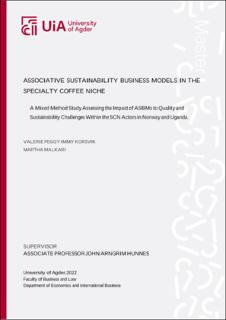| dc.description.abstract | Executive Summary
Purpose The coffee industry is traditionally known for ethical and sustainability challenges at the upstream. Specialty coffee is likely to make a difference through ethical sourcing strategies, more effective production practices, and higher quality products. This requires business models which rely on collaboration, association, and partnership.
Problem statement How can associative sustainable business models solve sustainability challenges within the specialty coffee sector?
Design/methodology/approach Using a mixed-method, we collected data from 184 Ugandan coffee farmers via questionnaires, Focus Group Discussions, key informant interviews, and transect walks. Furthermore, we conducted semi-structured interviews with one trader, one exporter, two estates from Uganda, and three roasters, one importer from Norway to examine the impacts of relationships between coffee producers and processors on sustainability and quality.
Findings Our findings showed that specialty coffee is based on direct relationships between upstream and downstream. This is also in line with the existing literature. However, relationships in different forms make it complicated. We found that connective businesses play an important role, especially where the farms are of small sizes, like in Uganda. The core of the specialty coffee niche is that actors rely on building and maintaining long-term relationships to increase quality. The findings indicated that collaboration, cooperation, and partnerships in sustainable business models within the specialty coffee niche can lead to socio-economic sustainability. Especially when stakeholders are acknowledged beyond elements.
Keywords: Environmental, Social, and economic, Stakeholder theory, Business model innovation, Relationships, Collaboration and Partnerships, Agricultural value chains, sustainability challenges, Specialty coffee Niche, Smallholder farmers, SDGs | |
